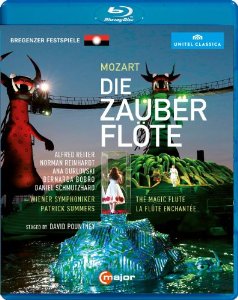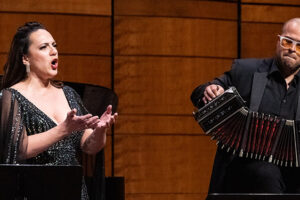
Having recently reviewed Glass’s The Perfect American on this site and participated in spirited discussions about the film Saving Mr. Banks, it is perhaps not surprising that Walt Disney should spring to my mind as I watched the Unitel Classica video
of Die Zauberflote from the floating stage of the Bregenzer Festspiele. One expects spectacle in all productions on the floating stage, but here the theme park antics completely overwhelm Mozart and Schikaneder’s simple fable.
Fireworks erupt, all the ladies and the boys are enormous puppets (as are their horses), giant blow-up plants form a jungle resembling the lawn in Honey, I Shrunk the Kids, all characters arrive and depart from the water on barges (at one performance a barge collapsed sending Pamina and the Queen of the Night in to the water where they had to be rescued by staff!). Papagena is a pom-pom wielding cheerleader spawned from an eggshell. Almost all of these vast scenic effects happen in the first ten minutes, leaving little new to happen in the rest of the piece.
Die Zauberflote is an opera that must be played with at least a bit of grounding in real intention and danger, or it can spiral into repetitive moments of playfulness and cutesiness. Alas, David Pountney’s production never seems to rise above the level of children’s theatre. All the performers are working way too hard at being amusing, with the exception of a very strong and grounded Norman Reinhardt as Tamino, a pleasure to hear and to watch, and the musically accurate and searing Queen of the Night of Ana Durlovski.
Now, some of Pountney and set designer Johan Engels effects are quite effective. The “sea serpent” coming from under water to attack Tamino is the most successful. I also liked the Trial by Water scene where body doubles of Tamino and Pamina simply walk into the water until they disappear. The excellent puppetry work from designer Marie-Jeanne Lecca and the Blind Summit Theatre add greatly to the sense of fantasy and magic.
But I kept having to remind myself that there’s an opera in there someplace. The score has significant cuts. Conductor Patrick Summers’ tempi were consistently slow, sometimes turgid; the playing of the Wiener Symphoniker rather listless. The singing, outside of the excellent Reinhardt and Durlovski, is pleasant and earnest but undistinguished. Even with a microphone, Alfred Reiter lacked the essential low notes for Sarastro; Martin Koch was a cartoonish and grainy-voiced Monostatos.
I quite liked Bernarda Bobro’s glistening soprano as Pamina, though she often acted the generic ingénue. Daniel Schmutzhard brings much life to Papageno and sings gamely, but his comic timing was “on” only part of the time. Papagena was a chirpily delightful Denise Beck. There was lovely singing from the three Ladies and the three Boys, with fine diction and clarity.
In the DVD’s accompanying booklet, David Pountney writes an essay in which he examines Die Zauberflote in great detail. His fascinating analysis of the opera as inhabiting several different worlds (Quest Opera, Opera of Ideas, Fairy Tale, Folk Tale) shines much light on the philosophical and psychological sides of the piece. Pountney clearly understands and admires the opera. But I fear that most of the ideas expressed in the essay simply haven’t translated to the stage. We get the charm, we get the magic, but we don’t get the ideas.
























Comments